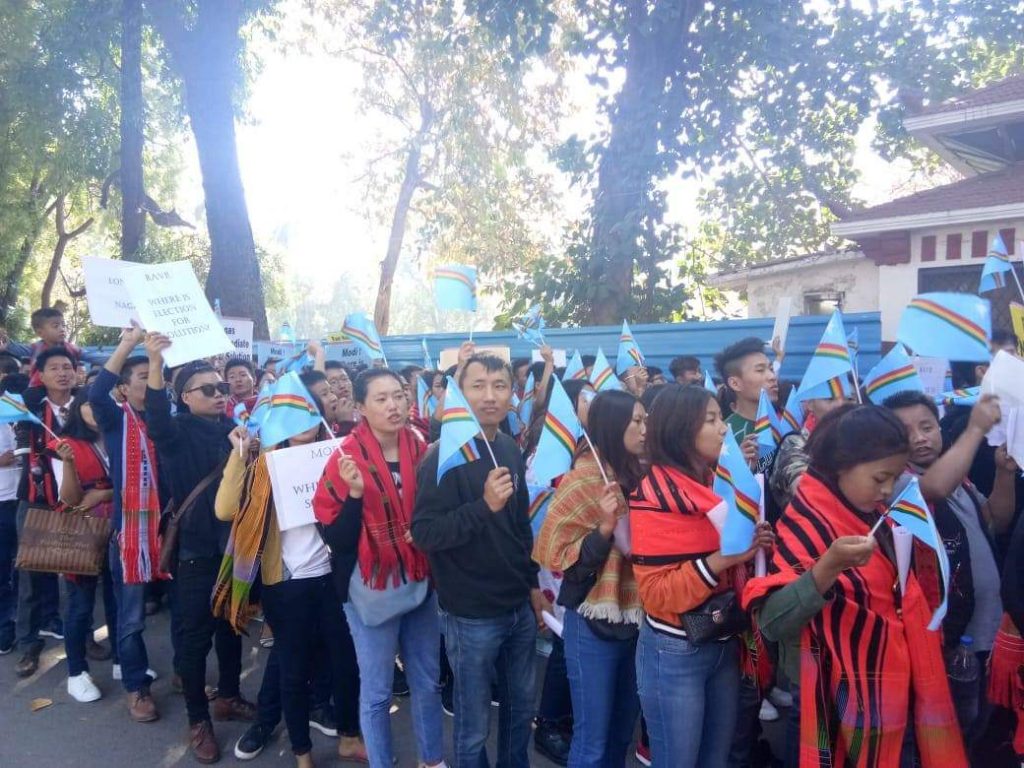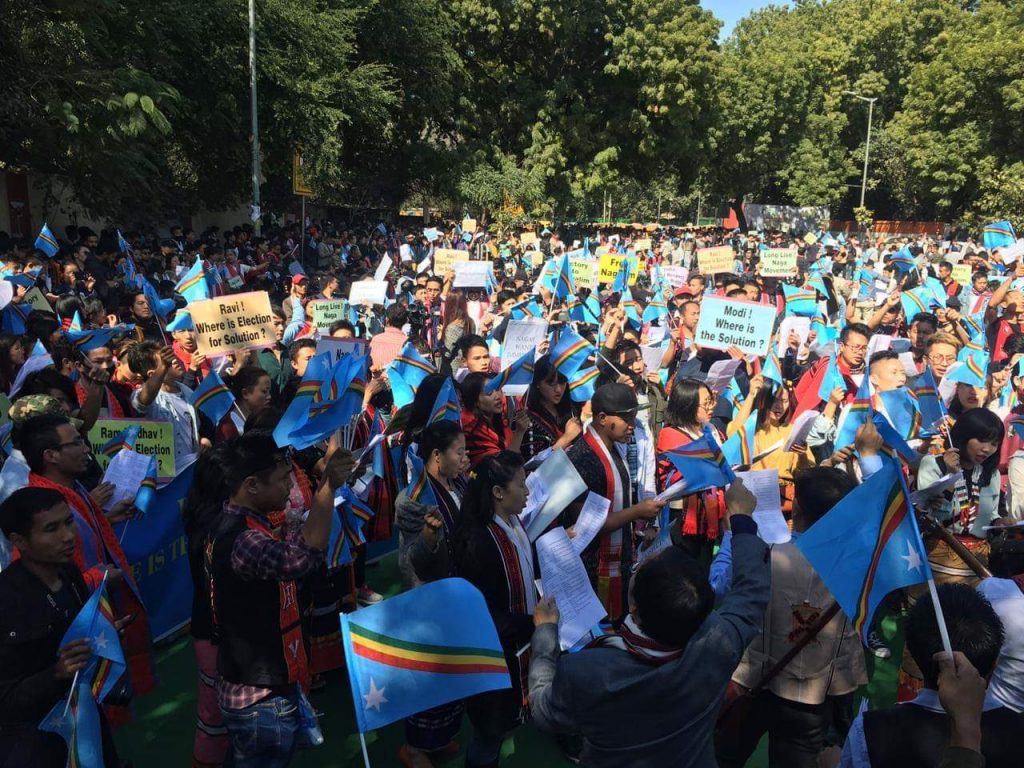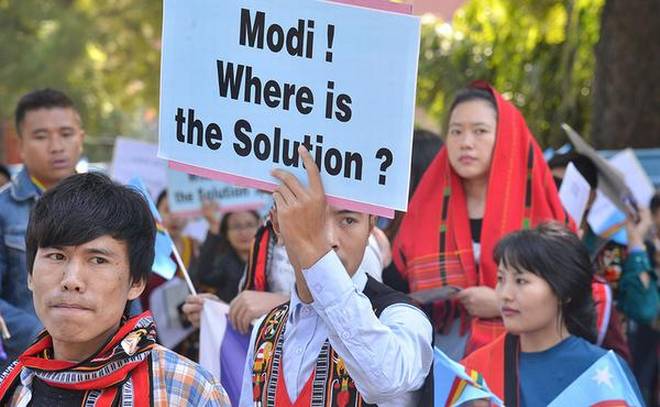The viewpoint of the NSA Ajit Doval on sovereignty is very similar to the one expressed by another hard line policy maker in the present Modi government—the National General Secretary of the BJP Ram Madhav.
Naga Republic News & Analysis

A section of the crowd gathered for the rally in Delhi on February 23 demanding immediate political solution to the Naga issue(Photo: ANI)
Against the backdrop of the latest mass rally in the national capital Delhi on the theme “Global Nagas Call for Immediate Political Solution – Honourable and Acceptable”, reliable reports now emerging suggest that tough negotiations are taking place on issues seen as ‘symbolic’ yet sensitive to the Nagas and thereby delaying the signing of a Naga Peace Accord
The recent statement of the National Security Advisor (NSA) Ajit Doval, terming as an “aberration” the incorporation of a separate constitution for Jammu and Kashmir under Article 370, is perhaps an indication of the hard-line stand of the present Narendra Modi government on some of the Naga demands like separate constitution, flag, passport etc.
The decision to take out the rally in Delhi by the Naga diaspora, both in India and abroad, is learned to have been taken against the backdrop of the “protracted Indo-Naga peace talks for over two decades which has not seen much progress to this day.
“The NSCN (IM) should understand the constraints of Modi govt and agree to sign whatever is given….the ball is in the court of NSCN (IM)….Central government has made their stand clear”, was what one unofficial source told The Naga Republic when questioned about the delay in concluding the talks. When queried further, the source had this to say.
“What is Naga people’s aspiration? Nagas don’t have answer to this question. Parroting irrelevant things is creating confusion in Delhi’s mind. If confusion prolongs a solution may be delayed beyond Parliamentary election”.
When asked by The Naga Republic about some of the issues sensitive to the Nagas, the source responded that “nothing is relevant except economic package and rehabilitation of armed cadres”.
Interestingly, the All-Party Parliamentary Committee had also asked the Ministry of Home Affairs (MHA) to prepare a detailed and generous rehabilitation-cum-settlement scheme for the NSCN-IM cadres who will surrender as per the Naga Accord.
After returning to power earlier in 2018, Nagaland Chief Minister Neiphiu Rio had said that the much awaited Naga peace accord was in its “final stages” and that issues related to “autonomy” have been settled between the Centre’s representative and Naga groups.
“Only symbolic issues such as flag and passport” are to be resolved, Rio had told The Indian Express on the sidelines of the first NITI Aayog meet for the Northeast in Agartala. Rio added, “The armed cadre of NSCN (IM) will be taken care of during the agreement.”

The rally in Delhi on February 23 demanding immediate political solution to the Naga issue(Photo: ANI)
Earlier reports had said that one of the proposals was to convert the armed cadres into Naga battalions which will be placed under the control of the state government while the Centre could fund and train them.
The Naga groups wanted a joint military grouping, which is to be supported by the Indian Army and the NSCN (IM)’s military wing, the ‘Naga Army’, the media had reported. However, what final decision is taken will be only known when the agreement is made public.
Mention may be made that the Government of India’s Interlocutor RN Ravi had told the Parliamentary Committee headed by senior Congress leader P Chidambaram that issues related to territorial integrity have been resolved and that “negotiations were going on over some symbolic issues, which are sensitive to both the government and the Nagas as well, and attempts are being made to reach a common understanding”.
At the same time the Parliamentary Committee had also recommended to the Government of India that it should “tread carefully on the issues sensitive to the Nagas and not let vested interests highjack the peace narrative”.
It appears that some of the key players in the present Modi government such as the all important National Security Advisor (NSA) and certain section of ideologues within the BJP-RSS are taking a more tough line on these symbolic issues.
Interestingly, NSA Ajit Doval, who is reportedly influencing the Modi government on crucial strategic and security related policy decisions has offered his take on sovereignty, which is at variance with the shared sovereignty that has been floated by the NSCN (IM).
Speaking at the launch of a book on Sardar Vallabhbhai Patel, the NSA in the Modi government had said that sovereignty “cannot be a diluted and ill-defined”, and added that when the “British left, probably they did not want to leave India as a strong sovereign state.”
Having a separate constitution for Jammu and Kashmir was probably an “aberration”, the NSA had said while stressing that sovereignty can never be compromised. “…And in nation-state, there was one law, one Constitution…Sovereignty can never be divided,” Doval said.

A question to Prime Minister Narendra Modi during the rally in Delhi on February 23 (Photo: The Hindu)
The viewpoint of the former top spy on sovereignty is very similar to the one expressed by another hard line policy maker in the present Modi government—the National General Secretary of the BJP Ram Madhav.
Interestingly it was Ram Madhav who coined the slogan ‘election for solution’ ahead of the crucial Nagaland Assembly election in early 2018.
In an article ‘Civilisational foundations of Indian State’, Ram Madhav, who was roped into the party from the Hindu right wing group Rashtriya Swayamsevak Sangh (RSS), while sharing his experience working in the Northeast region writes about how “those who wanted to challenge sovereignty…had to come down to the view, sovereignty is one and that is Indian sovereignty”.
The RSS-BJP points-man says that under Indian sovereignty “one can demand the moon”, perhaps referring to demands similar to the ones made by the Nagas.
What is holding back the signing of the Agreement therefore?
A recent report in the DNA newspaper points out on what was learnt from several stakeholders driving the talks. Apparently, one of the hurdles is the word “constitution”.
The Naga leaders and the Government of India seem to have agreed that the Indian Parliament will enact a Special Naga Law. Delhi is however not keen on using the word ‘constitution’, the DNA report states.
Whether this ‘Special Naga Law’ will be incorporated in the Indian Constitution or a separate constitution for the Nagas, as demanded by the NSCN (IM), it is still not clear.
While a consensus is yet to be developed, the word ‘izabo’ (Yezhabo) is likely to be adopted instead, the DNA report points out.
“The demand for a separate Naga flag is also making New Delhi uncomfortable. While the leaders contend that several states, such as Karnataka, Jammu and Kashmir, Meghalaya, Sikkim etc., have their own flag, the issue seems to be stuck”, states the report.
Uphold peace with honour on Indo-Naga political issue
Noted activist and Secretary General of the Naga Peoples Movement for Human Rights (NPMHR) Neingulo Krome, who was also present at the Delhi rally, has been advocating that India must ‘uphold peace with honour on the Indo-Naga political issue”.
In a statement issued some months back, the NPMHR leader said that India “has time and again proved itself unreliable to its own agreed principles in the courses of the peace discourses with the Naga National Movement which is born out of the inherent, legitimate and expressed will of the Nagas”.
“And while India may take pride for its efficient ability to deceive the Nagas the world must not any longer remain silent for consideration of the Indian market and must muster the moral authority to prevail upon India to be truthful and in earnest resolve one of the world’s longest political conflicts, the Indo – Naga political impasse”, Krome had said.
“At various stages of the dialogue, the GoI has attempted and is still attempting to undo its very own agreed principles. This was again proven when India wanted to push for a solution within its convenient parameters”, the senior Naga activist stated.







 What Does Your Face Say About Your Health?
What Does Your Face Say About Your Health? Meet R.N. Ravi, who is mediating peace with the Nagas
Meet R.N. Ravi, who is mediating peace with the Nagas The last Konyak headhunters of Nagaland
The last Konyak headhunters of Nagaland An orbiting message of peace
An orbiting message of peace










Leave a Reply
Your email address will not be published. Required fields are marked (required)